Saint Theophan the Recluse.

On January 23rd (the 10th by the old calendar) the Church commemorates the holy Russian hierarch Saint Theophan the Recluse.
St. Theophan was born Georgiy Vasilyevich Govorov on January 10, 1815 in the Chernavskoye village of the Yeletsk county in the Orlov province. The young Georgiy received his primary education at home. In 1823 he entered a religious school, while in 1829, as one of the school’s top students, he was transferred to the Orlov Seminary. The latter was headed by Archimandrite Isidor, who later became a well-known hierarch of the Russian Orthodox Church. After graduating from the seminary with top honors in 1836, Georgiy Govorov was assigned to the Kiev Theological Academy. In his last year of study Georgiy Govorov decided to dedicate himself entirely to serving the Church in a monastic capacity. In 1841 he was tonsured a monk with the name of Theophan, was subsequently ordained a hierodeacon, and soon afterwards became a hieromonk. In that same year Hieromonk Theophan graduated from the academy among its top students and began his service in the pedagogical field in various religious schools and academies. In this endeavor he showed himself to be a talented educator and a wonderful teacher. Being aware that the spiritual education of youth constitutes a great responsibility before God, Father Theophan tried to treat the future pastors primarily with kindness, love, and meekness.
Hieromonk Theophan was deeply dedicated to Christian education; however, he was also greatly attracted to solitary monastic life. Soon an opportunity arose to satisfy the spiritual yearnings of Father Theophan. In 1847, at his own request, he was appointed a member of the Ecclesiastical Mission in Jerusalem. His 6-year sojourn in the East had great spiritual and moral significance for Hieromonk Theophan. Visiting the ancient monasteries, he indefatigably studied the writings of the Holy Fathers from ancient manuscripts and became acquainted with the monastic rules and lives of the ancient ascetics of Eastern monasteries and holy Mount Athos. The young ascetic established close spiritual ties with the Athonite elders, who had a benign influence on the direction of his spiritual life and later promoted the publication of his writings. In 1853 the Crimean War began, and in 1854 the members of the Russian Ecclesiastical Mission were recalled from Jerusalem to Russia. For his labors in the mission Hieromonk Theophan was promoted to the rank of archimandrite and subsequently appointed to the position of dean of the St. Petersburg Theological Academy. In this position Father Theophan also engaged intensely in editorial and theological work.
In 1859 Archimandrite Theophan was ordained Bishop of Tambov. Bishop Theophan’s hierarchical service in the Tambov diocese lasted only four years. In that time, however, with his extraordinary meekness of nature, rare gracefulness, and sympathetic attention to the needs of his flock he succeeded in earning universal and quite sincere love. Bishop Theophan proved to be a zealous hierarch in all spheres of church life. In days of sorrow and in peacetime he was a loving father to all. Despite his numerous and diverse affairs and concerns in the ruling of his diocese, Bishop Theophan found time for learned and literary activity. During this period of time he wrote his theological opus “Letters on a Christian life,” which comprises an entire system of Christian moral teaching.
After 25 years of service to the Church in diverse spheres of endeavor, Bishop Theophan decided it was time to realize his long-standing aspiration. After consulting with his long-time spiritual advisor Metropolitan Isidor, he submitted a request to the Holy Synod to be allowed to retire to the Vyshy hermitage in the Tambov diocese. The Bishop’s request was approved, and in 1866 he was relieved of his diocesan duties. Long-awaited solitude, for which the hierarch had yearned so deeply, finally came to him by the mercy of God. For the first six years of his sojourn in the Vyshy hermitage Bishop Theophan did not cut himself off completely. Together with the hermitage monastics he attended all church services, and on Sundays and feast days he himself served the liturgy together with the brothers. He willingly welcomed visitors – relatives and admirers – who sought his spiritual counsel and guidance.
After the paschal days of 1872, he began to lead the life of a recluse. He cut off all contact with people, ceased going to the monastery church, and shut himself off in separate quarters. From that time on he saw only the abbot of the hermitage, his spiritual father, and his cell attendant. By that time Bishop Theophan set up a small church in his quarters in honor of the Baptism of our Lord, in which he served the Divine liturgy on all Sundays and feast days, and then daily for the last 11 years of his life.
The hierarch’s life of solitude was spent in services and prayer, in physical and spiritual labors. In his free time he worked on literary theological writings and wrote a multitude of letters to various people who turned to him with perplexing questions and appeals for help and guidance. Having left the world and ceased to meet people, the reclusive Bishop was nevertheless interested in the life of the Church and of his homeland. He subscribed to many magazines. There was a huge library in his office. In his writings the hierarch made extensive use of literary works in the Russian and foreign languages.
The topics and content of the writings of the Vyshy recluse were quite diverse. Not a single detail of spiritual life escaped his deep and attentive observation. But the major theme of his many works is salvation in Christ. Just an enumeration of his writings causes awe. His oeuvre is divided by content into three sections: moralistic, interpretive, and translational. Of especially great value for theology are the hierarch’s many writings on Christian morality. In his moralistic works Bishop Theophan depicted the ideal of Christian life and the paths leading to its achievement. St Theophan’s writings also define the basic principles of patristic psychology.
One of the most important achievements of Bishop Theophan’s life work are his wonderful interpretations of the Word of God, which represent a valuable asset to the Russian Scriptural collection. The hierarch’s most important translational work is the Philokalia, whose major subject comprises writings on spiritual life by the founders and great teachers of Christian asceticism. A special facet of Bishop Theophan’s literary oeuvre are his numerous letters, which he exchanged with everyone who asked for his advice, support, and guidance, beginning with high-ranking officials and ending with the common folk. The hierarch preserved his sincerity and love for people to his blessed end.
On January 6, 1894, on the feast day of his small church of the Baptism of our Lord, at about 4:00 P.M., the holy Bishop Theophan peacefully reposed.
Saint Theophan was canonized in 2000 by the Bishop's Counil of the Russian Orthodox Church Outside of Russia in Munich. His memory destined to take place on the day of his birth on January 10/23.
Writings of St. Theophan the Recluse:
The Art of Prayer - An Orthodox Anthology
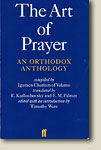 This was the book that introduced me to St. Theophan the Recluse, and that prompted me to embark on the path of Orthodox Christianity. It is a kind of "prayer manual," compiled by the abbott ("igumen") of a revered Orthodox monastery who collected his favorite writings on the interior life, those he felt would be most helpful for his monks. The very great majority of these writings were from letters of spiritual direction written by St. Theophan the Recluse. I love this book!
This was the book that introduced me to St. Theophan the Recluse, and that prompted me to embark on the path of Orthodox Christianity. It is a kind of "prayer manual," compiled by the abbott ("igumen") of a revered Orthodox monastery who collected his favorite writings on the interior life, those he felt would be most helpful for his monks. The very great majority of these writings were from letters of spiritual direction written by St. Theophan the Recluse. I love this book!
The Art of Prayer - An Orthodox Anthology, Igumen Chariton of Valamo, compiler, Faber and Faber, London, 1997.
Unseen Warfare
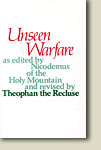 Unseen Warfare's "first author" is not St. Theophan but a Roman Catholic writer, Lorenzo Scupoli. But St. Nicodemos of the Holy Mountain, an Orthodox saint, found Scupoli's book wonderful and adapted it for Orthodox readers, also adding many notes and illustrations from Scripture and the Fathers of the Eastern Church. Then,
Unseen Warfare's "first author" is not St. Theophan but a Roman Catholic writer, Lorenzo Scupoli. But St. Nicodemos of the Holy Mountain, an Orthodox saint, found Scupoli's book wonderful and adapted it for Orthodox readers, also adding many notes and illustrations from Scripture and the Fathers of the Eastern Church. Then,
Bishop Theophan the Recluse, a director of souls and an ascetic theologian of note, who was acquainted with Nicodemus' writings, was moved by his admiration of them to translate the Unseen Warfare from Greek into Russian. Like Nicodemus, and on an even greater scale, he allowed himself in translating it to make various changes and adaptations. The resulting version, supported by the double authority of Nicodemus and Theophan, took an assured place in the spiritual literature of the Russian Church. [From the Introduction to the book.]
The title, in our mostly Protestant culture, is potentially somewhat misleading. It's a wonderful manual on the inner life.
Unseen Warfare - as edited by Nicodemus of the Holy Mountain and revised by Theophan the Recluse, St. Vladimir's Seminary Press, Crestwood, NY 2000.
The Path to Salvation - A Manual of Spiritual Transformation
 This is the third book of St. Theophan's that I read, and his magnum opus. I understand that it was originally published as three separate books that later were combined into one. the major sections are, "How Does the Christian Life Begin in Us?", "On Repentance and the Sinner's Turning Toward God," and, "How the Christian Life is Lived, Ripened and Fortified, and About the Order of a God-Pleasing Life."
This is the third book of St. Theophan's that I read, and his magnum opus. I understand that it was originally published as three separate books that later were combined into one. the major sections are, "How Does the Christian Life Begin in Us?", "On Repentance and the Sinner's Turning Toward God," and, "How the Christian Life is Lived, Ripened and Fortified, and About the Order of a God-Pleasing Life."
The Path to Salvation - A Manual of Spiritual Transformation, St. Theophan the Recluse, Fr. Seraphim Rose & St. Herman of Alaska Brotherhood, trans., St. Herman of Alaska Brotherhood, St. Paisius Abbey, 1998.
Four Homilies on Prayer
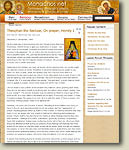 I LOVE these homilies! They are very simple, but wonderful. St. Theophan wrote these four homilies for some nuns. I originally found them in a book, but I had some reservations about that book (see The Path of Prayer below in this list). Now I have found that the same homilies have been translated into English, and by an Orthodox priest! They have been published on an Orthodox web site. I have no concerns about "chaff" in the "wheat" here, and I heartily recommend these instead of the book, The Path of Prayer:
I LOVE these homilies! They are very simple, but wonderful. St. Theophan wrote these four homilies for some nuns. I originally found them in a book, but I had some reservations about that book (see The Path of Prayer below in this list). Now I have found that the same homilies have been translated into English, and by an Orthodox priest! They have been published on an Orthodox web site. I have no concerns about "chaff" in the "wheat" here, and I heartily recommend these instead of the book, The Path of Prayer:
Psalm 118 - A Commentary by Saint Theophan the Recluse
 This is new in 2014, I only learned about it and purchased it recently, and I have just begun reading it, but what I have read so far is wonderful!
This is new in 2014, I only learned about it and purchased it recently, and I have just begun reading it, but what I have read so far is wonderful!
Psalm 118 - A Commentary by Saint Theophan the Recluse, St. Theophan the Recluse, Archpriest Gleb Wleskov, trans., revised by Seraphim Englehart, Archpriest Gregory Williams, ed., St. John of Kronstadt Press, Liberty, TN, 2014.
The Spiritual Life - and How to be Attuned to It
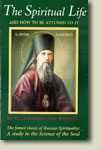 This was the second book I read of St. Theophan's. It is a collection of letters to one of his spiritual children, a young woman of Moscow society who, while at an annual ball, was struck by the thought of the immortality of the soul and the futility of everything around her at the ball, and began the correspondence with then-Bishop Theophan. She eventually became a nun. For some reason the original edition from the St. Herman's Press seems to be out of print, but the same translation now is available in a very slightly different (3rd) edition, with different introductory materials, from St. Paisius Serbian Orthodox Monastery.
This was the second book I read of St. Theophan's. It is a collection of letters to one of his spiritual children, a young woman of Moscow society who, while at an annual ball, was struck by the thought of the immortality of the soul and the futility of everything around her at the ball, and began the correspondence with then-Bishop Theophan. She eventually became a nun. For some reason the original edition from the St. Herman's Press seems to be out of print, but the same translation now is available in a very slightly different (3rd) edition, with different introductory materials, from St. Paisius Serbian Orthodox Monastery.
The Spiritual Life - and How to be Attuned to It, St. Theophan the Recluse, Alexandra Dockham, trans., St. Herman of Alaska Brotherhood, St. Paisius Abbey, 1995.
The Spiritual Life - and How to be Attuned to It, St. Theophan the Recluse, 3rd Eidtion, Alexandra Dockham, trans., St. Paisius Serbian Orthodox Monastery, 2003.
A Spiritual Psalter
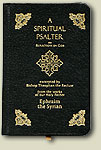 This book wasn't actually written by St. Theophan, but it was compiled and edited by him. I include it mostly because I really like the book, and it was a labor of love by St. Theophan. From the Preface:
This book wasn't actually written by St. Theophan, but it was compiled and edited by him. I include it mostly because I really like the book, and it was a labor of love by St. Theophan. From the Preface:
This publication, which includes selected prayers that St. Ephraim the Syrian offered up to God, is called a Psalter because the Psalter is a book of praises to God; they both contain prayers offered up to God. St. Ephraim was filled with the grace of God and, moved by it, he poured out his heartfelt prayers to God.
A Spiritual Psalter, or Reflections on God - excerpted by Bishop Theophan the Recluse from the works of our Holy Father Ephraim the Syrian, Antonina Janda, trans., St. John of Kronstadt Press, Liberty, TN, 1997.
Thoughts for Each Day of the Year According to the Daily Church Readings from the Word of God
 For a few years, at least, this was only available on a Russian site online (click on the link to the calendar on that page), but at last in 2010 the St. Herman of Alaska Brotherhood, in collaboration with the Sretensky Monastery in Moscow, has published this book in English!
For a few years, at least, this was only available on a Russian site online (click on the link to the calendar on that page), but at last in 2010 the St. Herman of Alaska Brotherhood, in collaboration with the Sretensky Monastery in Moscow, has published this book in English!
... St. Theophan takes us through the yearly cycle of Gospel and Epistle readings, humbly and reverently offering us brief but powerful daily meditations on the word of God. He also addresses the problems of his day -- lack of faith, coldness of heart, trust in the rational mind rather than in the revealed Truth of God -- which are problems for our day as well.
Kindling the Divine Spark
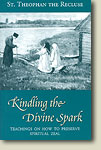 This slender book is a collection of homilies that St. Theophan wrote for female monastics.
This slender book is a collection of homilies that St. Theophan wrote for female monastics.
Kindling the Divine Spark - Teachings on How to Preserve Spiritual Zeal, St. Theophan the Recluse, St. Herman of Alaska Brotherhood, St. Xenia Skete, 1996.
Matericon
![]() This book was not written by St. Theophan, but he apparently highly valued it, translating it into Russian for his spiritual children. It contains a brief introductory preface by St. Theophan and an appendix containing some of his correspondence from the last year of his life. The body of the book is instructions from Abba Isaiah to the Honorable Nun Theodora.
This book was not written by St. Theophan, but he apparently highly valued it, translating it into Russian for his spiritual children. It contains a brief introductory preface by St. Theophan and an appendix containing some of his correspondence from the last year of his life. The body of the book is instructions from Abba Isaiah to the Honorable Nun Theodora.
Matericon - Instructions of Abba Isaiah to the Honorable Nun Theodora, St. Paisius Serbian Orthodox Monastery, Safford, AZ, 2001.
On Prayer
 This is a small booklet containing a number of excerpts from some of St. Theophan's letters.
This is a small booklet containing a number of excerpts from some of St. Theophan's letters.
On Prayer - From the Writings of Bishop Theophan the Recluse, St. John of Kronstadt Press, Liberty, TN.
Psalm 118/119
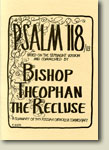 This is a booklet that contains "A summary of this Russian Orthodox commentary," a verse-by-verse commentary on Psalm 118 (as numbered in the Septuagint -- Psalm 119 in Western Bibles), "Blessed are the blameless in the way...," by St. Theophan the Recluse. It is a very brief summary of a much longer discourse that at last has been published in English (see above). There is no information in the booklet about who translated or published this aside from "F. Gleb" on the front cover.
This is a booklet that contains "A summary of this Russian Orthodox commentary," a verse-by-verse commentary on Psalm 118 (as numbered in the Septuagint -- Psalm 119 in Western Bibles), "Blessed are the blameless in the way...," by St. Theophan the Recluse. It is a very brief summary of a much longer discourse that at last has been published in English (see above). There is no information in the booklet about who translated or published this aside from "F. Gleb" on the front cover.
Psalm 118/119 Based on the Septuagint Version and Commented by Bishop Theophan the Recluse - A Summary of This Russian Orthodox Commentary, F. Gleb.
The Heart of Salvation - The Life and Teachings of Saint Theophan the Recluse
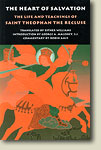 This book, like The Path of Prayer mentioned below, is published by people who are interested in so-called "esoteric" Christianity, which makes me quite hesitant about their books, concerned about the possibility of Theosophical, "Gnostic" or other heterodox "tares" being perhaps unintentionally mixed in with the Orthodox "wheat" of the book. It is unfortunate, because I am not aware of another source so extensive about St. Theophan's life.
This book, like The Path of Prayer mentioned below, is published by people who are interested in so-called "esoteric" Christianity, which makes me quite hesitant about their books, concerned about the possibility of Theosophical, "Gnostic" or other heterodox "tares" being perhaps unintentionally mixed in with the Orthodox "wheat" of the book. It is unfortunate, because I am not aware of another source so extensive about St. Theophan's life.
The Heart of Salvation - the Life and Teachings of Saint Theophan the Recluse, Esther Williams, Trans., Praxis Institute Press, Newbury, MA, (no date listed).
Turning the Heart to God
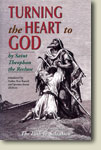 This is different translation of the middle portion of St. Theophan's The Path to Salvation. I bought it because I was eager to buy anything that he wrote, but I must confess that I only read some bits and pieces of this, and so greatly preferred the Seraphim Rose translation that I had enjoyed so much that I didn't wind up even finishing it.
This is different translation of the middle portion of St. Theophan's The Path to Salvation. I bought it because I was eager to buy anything that he wrote, but I must confess that I only read some bits and pieces of this, and so greatly preferred the Seraphim Rose translation that I had enjoyed so much that I didn't wind up even finishing it.
So far as I can see, the translator, Father Ken Kaisch, is not Orthodox, but a clinical psychologist and Episcopal priest. Obviously that doesn't mean he didn't necessarily do a faithful job of translating this book by an Orthodox saint. But by contrast, I love the image of Father Seraphim Rose, of blessed memory, an Orthodox hieromonk who I understand is beloved in Russia, working on his translation of St. Theophan's work in the prayerful and austere monastic atmosphere of the skete of St. Herman. Father Seraphim, like St. Theophan, burned with holy zeal for Christ as he labored, a recluse himself, with only one or a few others at the skete. And Father Seraphim had a very clear and strong "feel" for the Orthodox phronema or mind set, which can be very different from our normal Western way of thinking and perceiving things. So I have a special fondness for Father Seraphim's translation of The Path to Salvation, published by the St. Herman's Press (see above), which includes a different translation of the same original work of St. Theophan's.
Turning the Heart to God, Saint Theophan the Recluse, Father Ken Kaisch and Igumen Ioana Zhiltsov, trans., Conciliar Press, Ben Lomond, CA, 2001.
The Path of Prayer
 This is a wonderful little book, a kind of "primer" on prayer that I have read many times, finding each time I have reread it that it was still good for me to read it again, and helpful. Unfortunately, this book is printed by an organization that seems oriented toward a "Gnostic," or so-called, "esoteric" Christianity that I believe St. Theophan would have found deeply misguided. This little book, however, I considered a gem.
This is a wonderful little book, a kind of "primer" on prayer that I have read many times, finding each time I have reread it that it was still good for me to read it again, and helpful. Unfortunately, this book is printed by an organization that seems oriented toward a "Gnostic," or so-called, "esoteric" Christianity that I believe St. Theophan would have found deeply misguided. This little book, however, I considered a gem.
I no longer recommend it, however, because of a much better alternative (see above, the "Four Homilies on Prayer," which are a different translation of the same texts by an Orthodox translator).
The Path of Prayer - Four Sermons on Prayer, Theophan the Recluse, Williams, Esther, trans., Praxis Institute Press, Devon, England, 1992.
Preaching Another Christ
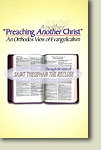 This is a booklet, a little over 40 pages, with a very brief history of St. Theophan and an essay of his on how he perceived Evangelicalism as it was in Russia in his time.
This is a booklet, a little over 40 pages, with a very brief history of St. Theophan and an essay of his on how he perceived Evangelicalism as it was in Russia in his time.
"Preaching Another Christ" - An Orthodox View of Evangelicalism Through the Eyes of Saint Theophan the Recluse, St. Theophan the Recluse, Orthodox Witness, Maryville, IL, 2001.
Is It Sufficient Only to Believe in Christ in Order to be Saved?
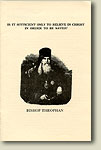 This very brief pamphlet summarizes some teachings of St. Theophan about the Protestant view of salvation contrasted with the Orthodox view.
This very brief pamphlet summarizes some teachings of St. Theophan about the Protestant view of salvation contrasted with the Orthodox view.
Is It Sufficient Only to Believe in Christ in Order to be Saved?, Bishop Theophan, originally published in Orthodox Life, Holy Trinity Monastery, Jordanville, NY., Reprinted by Eastern Orthodox Books, Willits, CA.
23.01.2019
